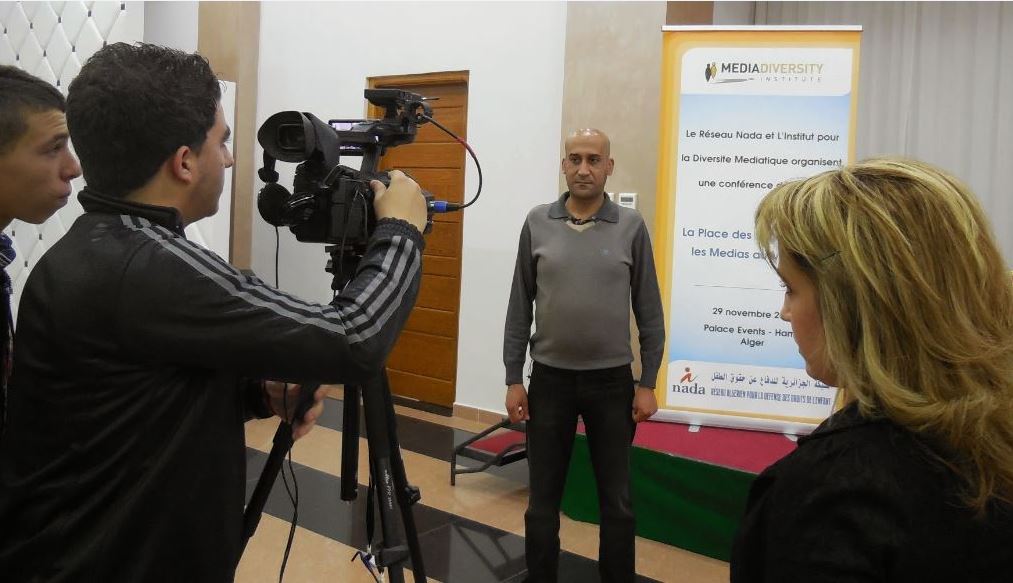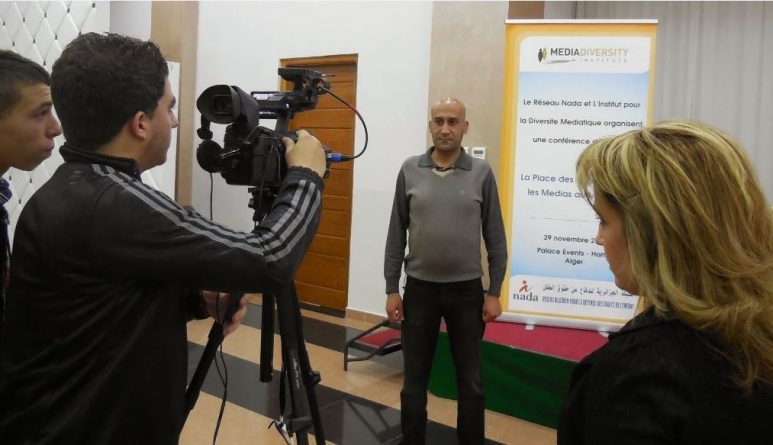Date: 29 November 2014
Country: Algeria
 ‘Welcome, Ebola and AIDS’ and ‘Africans create their Republic’ – these are just some of the headlines in the Algerian media about refugees and migrants. Discriminatory language and hate speech appear to be the norm in media coverage of these issues across the Magreb region.
‘Welcome, Ebola and AIDS’ and ‘Africans create their Republic’ – these are just some of the headlines in the Algerian media about refugees and migrants. Discriminatory language and hate speech appear to be the norm in media coverage of these issues across the Magreb region.

Also, migrants and refugees coming from Sub-Saharan Africa are treated worse than those coming from the MENA region, explained Dr Nabila Bouchaala, speaking at a roundtable debate on ‘Media Coverage of Refugees in the Magreb’ organized by the Media Diversity Institute (MDI) and its partner, Réseau Algérien pour la Défense des Droits des Enfants (NADA), on 29th of November in Algiers.
‘There is some kind of solidarity with Syrian refugees because they are Arabs and Muslims, but as the time goes by, even they are also described by the media as profiteers, usurpers and beggars’, said Dr Bouchaala.
The debate was organized as part of the project “Inclusive Media for an Inclusive Society: Building the presence of youth and marginalized voices in Algeria”, funded by the UK Embassy in Algiers, and was a good opportunity for the participants from the media, civil society and academia to reflect on the importance of abandoning discriminatory and derogatory language towards one of the most vulnerable and marginalized groups in the Magreb.
 Some of the participants highlighted that there is still confusion between the terms ‘refugees’ and ‘migrants’. Most of the media tend to use generalization when reporting on the issue. For example, some journalists use the broader term ‘Africans’ instead of the particular nationality of a person in question. The media’s portrayal in most cases is problematic since migrants and refugees alike are described as ‘invaders, criminals and people carrying diseases (AIDS, Ebola, etc)’.
Some of the participants highlighted that there is still confusion between the terms ‘refugees’ and ‘migrants’. Most of the media tend to use generalization when reporting on the issue. For example, some journalists use the broader term ‘Africans’ instead of the particular nationality of a person in question. The media’s portrayal in most cases is problematic since migrants and refugees alike are described as ‘invaders, criminals and people carrying diseases (AIDS, Ebola, etc)’.
In Morocco, the media sometimes use highly offensive terms to describe immigrants such as ‘azzi’, an equivalent of the term ‘nigger’. However, when the presenter of a TV show in Morocco in 2013 called a black person ‘azzi’, other media professionals denounced that kind of reporting, and the government issued instructions to avoid racist and discriminatory language, said Salaheddine Lemaizi, a journalist from Morocco, and guest speaker at the event.
Speaking about the Tunisian experience, another speaker and journalist, Moez Jemal, said that Tunisia wasn’t ready for the large numbers of people coming from neighbouring countries. ‘This led to unprofessional coverage by the Tunisian media,’ said Jemal, adding that the common aspect between Algeria and Tunisia is the treatment of the Syrian, Palestinian and Egyptian communities who are not truly considered as refugees. ‘At the moment Tunisia is facing the issue of illegal immigrants coming from African countries, taking advantage of the Libyan crisis and traveling there and further on to Europe,’ said Jemal.
During the debate, Abderrahmane Arar, President of NADA, spoke about the civil society and legal aspects related to migrants and refugees. He explained the status of refugees under Algerian law is not clear, and that many asylum seekers and economic/social migrants are not legally, but only de facto, recognized in the country. NADA campaigns for the rights of refugees and migrants, particularly children, in relation to access to education, healthcare and the labour market.
The roundtable received extensive media coverage, which included reports by the Algerian News Agency, as well as private newspapers and TV channels. The following are links to some of the coverage:
http://www.liberte-algerie.com/actualite/halte-a-la-stigmatisation-des-subsahariens-3404

